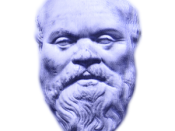One's personal philosophy cannot be based on a single set of ethics. A personal philosophy is a combination of normative and applied ethics. My ethical philosophy is an eclectic composite of the virtues and theories derived from Aristotle, Kant, and the teleological theories. Normative ethics, which include the virtue theory, duty theories, and teleological theories, are critical in determining an approach not only to education, but also to all aspects of one's life.
In education, the combination of different components from each theory complements the set of beliefs that a person combines to create a strong system of beliefs and values by which to live and function. In education, one can use educational philosophies to direct him/her in guiding children along the path of enlightenment. Five key educational philosophies are useful in empowering one to recognize in the field of education including "Essentialism, Perennialism, Progressivism, Existentialism, and Behaviorism" (Sadker & Sadker, 1994).
However, it is necessary to have a personal ethical foundation, which underlies the educational philosophies that are developed through social, historical, and environmental influences in one's life. My ability to tackle certain dilemmas requires that I have set goals based on strong beliefs and values to provide the guidance I need to engage in personal pursuits. Therefore, I prefer looking at the ethical beliefs as a guide to my beliefs in understanding my personal beliefs and goals because a certain set of beliefs guides one in making logical decisions when he/she face certain dilemmas.
In the virtue theories, the moral beliefs consist of developing good habits of character (Cooney, Cross, & Trunk, 1993). Plato emphasized the virtue theory. He focused on four basic virtues: wisdom, courage, temperance, and justice. Plato believed that these virtues or moral education is more effective when developed during youth. These character traits were...


